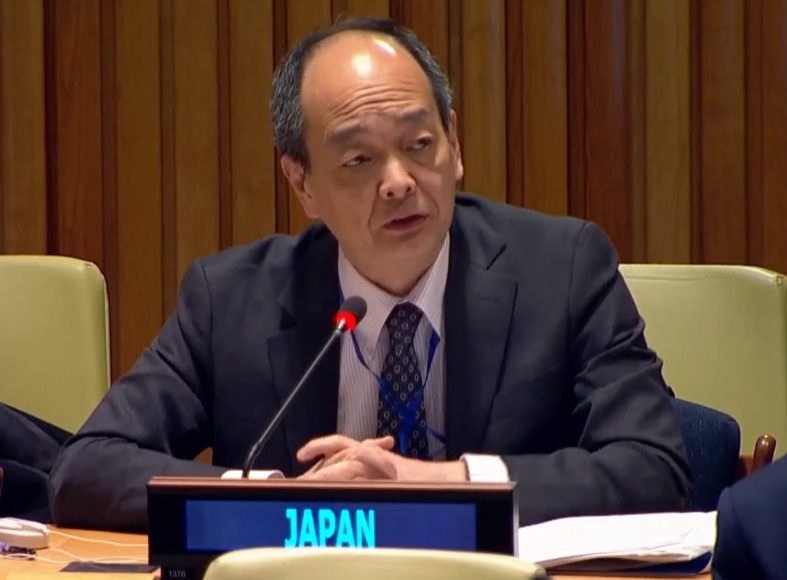グローバル・デジタルコンパクト第一回非公式協議における山中大使ステートメント
令和5年1月30日

(As delivered)
Thank you Co-Chairs, for hosting this first informal consultation on the Global Digital Compact.
At the outset, I would like to thank the co-facilitators Ambassador Eneström and Ambassador Gatete for their leading role, and the Secretary-General's Envoy on Technology USG Gill for his support. I would like to take this opportunity to share Japan’s initial thoughts on the consultation process of the GDC.
First, Japan hopes that the GDC will effectively reflect the UN Secretary-General's Roadmap for Digital Cooperation and relevant in-depth discussions to date in other forums. Japan has been actively participating in the discussions on the Roadmap, believing that strengthening global digital cooperation is essential to achieving the SDGs and pursuing a world where no one is left behind. We would like to deepen the discussion on the GDC by building on those relevant discussions. We also hope to feed the outcomes of the Internet Governance Forum (IGF) 2023 to be held in Japan into discussions on the GDC. Free, open, and reliable Internet is the foundation of people's engagement in today’s society. It is essential to promote internet governance through a multi-stakeholder approach, and we hope that many stakeholders will participate in discussions at the IGF meeting in Japan.
Second, we wish the GDC discussions to proceed, including by mapping out what is being achieved under the entire UN system, as pointed out by the Singaporean Ambassador. In this regard, we should utilize expertise of the ITU in this area both at the field and headquarters level and closely involve the ITU under its leadership renewed this month throughout the process. We remain committed to contributing to the realization of "Our Common Agenda" through the development of telecommunications worldwide, and also through the creation of fair and open rules in the field of telecommunications network standardization, including in developing countries, where technological innovation is rapidly advancing.
Third, Japan believes that human rights and fundamental freedoms should be fully respected online as well as offline, along with the principles of connectivity and inclusiveness. Japan has been engaging actively in this field as well, including by co-sponsoring resolutions on freedom of expression on the Internet in the Human Rights Council. The Internet is the foundation of social and economic activities in the public and private sectors in the modern era. Ensuring the data free flow with trust and freedom of expression on the Internet promotes economic growth, employment, development, democracy, and the protection of human rights. To this end, Japan would like to work together with the other member countries.
We would like to hear others’ thoughts followed by the Secretary-General’s policy brief in April.
At the outset, I would like to thank the co-facilitators Ambassador Eneström and Ambassador Gatete for their leading role, and the Secretary-General's Envoy on Technology USG Gill for his support. I would like to take this opportunity to share Japan’s initial thoughts on the consultation process of the GDC.
First, Japan hopes that the GDC will effectively reflect the UN Secretary-General's Roadmap for Digital Cooperation and relevant in-depth discussions to date in other forums. Japan has been actively participating in the discussions on the Roadmap, believing that strengthening global digital cooperation is essential to achieving the SDGs and pursuing a world where no one is left behind. We would like to deepen the discussion on the GDC by building on those relevant discussions. We also hope to feed the outcomes of the Internet Governance Forum (IGF) 2023 to be held in Japan into discussions on the GDC. Free, open, and reliable Internet is the foundation of people's engagement in today’s society. It is essential to promote internet governance through a multi-stakeholder approach, and we hope that many stakeholders will participate in discussions at the IGF meeting in Japan.
Second, we wish the GDC discussions to proceed, including by mapping out what is being achieved under the entire UN system, as pointed out by the Singaporean Ambassador. In this regard, we should utilize expertise of the ITU in this area both at the field and headquarters level and closely involve the ITU under its leadership renewed this month throughout the process. We remain committed to contributing to the realization of "Our Common Agenda" through the development of telecommunications worldwide, and also through the creation of fair and open rules in the field of telecommunications network standardization, including in developing countries, where technological innovation is rapidly advancing.
Third, Japan believes that human rights and fundamental freedoms should be fully respected online as well as offline, along with the principles of connectivity and inclusiveness. Japan has been engaging actively in this field as well, including by co-sponsoring resolutions on freedom of expression on the Internet in the Human Rights Council. The Internet is the foundation of social and economic activities in the public and private sectors in the modern era. Ensuring the data free flow with trust and freedom of expression on the Internet promotes economic growth, employment, development, democracy, and the protection of human rights. To this end, Japan would like to work together with the other member countries.
We would like to hear others’ thoughts followed by the Secretary-General’s policy brief in April.
